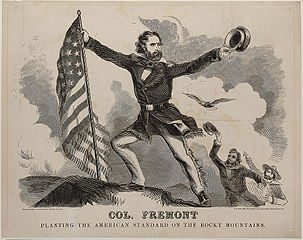Donald Trump won the South Carolina primary building on his New Hampshire win. He is the frontrunner, but South Carolina will also trim the field of the first frontrunner: Jeb Bush.

Last night proved a new era of Republican Party politics has begun.
This race for the Republican nomination has no perfect historic parallel, but it is most like the elections of 1860, 1904, 1932, 1952, 1980. My family has participated (as voters) in GOP politics since Lincoln made our home state free of the abuses of the slavers and the plantation class and so I look at every primary through family stories and experiences.
We should all stop saying: “The GOP always does this or normally the Republican Party does the other thing . . . ” Pundits must begin by acknowledging how few elections there have actually been. It is hard to generalize properly for three or four examples! We often forget how unusual 2016 is . . . GOP out of power for eight years, no strong front runner.
Tonight, for my own benefit, I surveyed the history of the nomination fights in the Party and saw, once again, that this is a transformational fight for the Party.
Feel free to skip the historic summary and cut to the bottom line.
A Brief History Lesson to Show that There are No Rules
The Era of Lincoln-Grant
In 1864, all good Republicans were for Mr. Lincoln, the incumbent.
In 1868, US Grant had saved the Union, won the Party and in 1868 he was the incumbent.
The race in 1876 was wild and wooly with crooks, bosses, and Rutherford B. Hayes.
1880 gave us the sainted James Garfield in another tumultuous primary.
1884 saw my family vote for our first loser: James G. Blaine after another bloody fight for the nomination.
1888 gave us Benjamin Harrison who won and then lost in 1892.
1896 saw the rise of William McKinley who was reelected in 1900 with his charismatic running mate Theodore Roosevelt.
The Era of Roosevelt-Taft (Progressive-Conservative Dual)
1904 saw Roosevelt elected to his own term and all was bully.
1908 saw Roosevelt pick William Taft as his successor.
1912 was the worst nomination fight in Republican history as Teddy won the voters, but Taft kept the bosses. This split the party and so elected the worst President of the 20th century: Woodrow Wilson.
1916 nomination tried to heal the split and Charles Hughes almost won the race. He marked the first time my family voted for the loser twice in a row!
1920 was a barnburner of a primary that went to Warren G. Harding and 1924 saw his successor Vice President Calvin Coolidge win in a walk.
1928 was a red hot race that saw progressive Herbert Hoover the winner. He would come to regret this triumph as his bid for reelection in 1932 was doomed by a problem called the Great Depression.
The Powerless Era under Franklin Roosevelt
The Republican Party faced Franklin Roosevelt four times, and three of those races were “open” after Hoover was wiped out. In every case, the “winner” was a sacrificial lamb to Roosevelt: 1936 Landon lost, 1940 was the turn of Wendell Willkie and Thomas Dewey lost in 1944.
1948 was the first nomination worth having and Thomas Dewey, the Buffalo Bills of nominees, got to lose narrowly to Harry Truman for Roosevelt’s fifth term.
The Eisenhower-Nixon Era
1952 and 1956 did start with a fight between Dwight Eisenhower and Senator Bob Taft, but the nation liked Ike and he was an easy winner in the general election. This was the first time that the “establishment” defeated a more conservative choice.
1960 had an easy front runner in Richard Nixon in Ike’s Veep who lost narrowly to JFK.
1964 was the revenge of the conservatives when Barry Goldwater seized the party from the establishment to get destroyed by LBJ.
1968 saw Richard Nixon come back and then win reelection in a landslide in 1972.
1976 had incumbent Gerald Ford (Nixon resigned due to Watergate) defeat Ronald Reagan.
The Reagan-Bush Era
1980 marked Reagan as a clear frontrunner who disposed of his rivals and then won a landslide reelection in 1984.
1988 saw George H.W. Bush take over for the Gipper and then lose reelection in 1992.
1996 gave Bob Dole the chance to be the sacrificial lamb to Bill Clinton.
2000 was the Bush and McCain fight, but it wasn’t really much of a fight and in 2004 Bush won reelection.
2008 was John McCain’s turn and he lost a race no Republican could have won to Barack Obama.
2012 had an early favorite in “runner up” from 2008 Mitt Romney. Romney prevailed and then lost to President Obama.
The Data Set is Too Small for Rules
My family has voted in every GOP primary and has faced only nineteen or twenty disputed races in the entire history of the Republican Party. After Lincoln, we elected his heir US Grant. The nomination fights from 1868-1896 were dominated by finding the man who could keep the Lincoln-Grant ruling coalition in power. By 1904 the Party had to change and Theodore Roosevelt changed it. He made the Party a leader in needed reforms, but reaction to and the fight over his progressive (for the time) politics and his personality dominated the Party (directly or indirectly) up through the 1920 election. The Great Depression nearly ended the Republican Party, but Eisenhower gave the GOP Presidential relevance and his heir, Richard Nixon, was the center of party politics through 1980. The Republican Party was his, or was reacting to him, or recovering from him throughout that period. Reagan and his Vice President George Bush dominated the Party from 1980 to 2016. A Bush won the nomination three times after Reagan while Dole, McCain, and Romney were all in the Reagan-Bush mold or tried to pretend they were.
Just as the Civil War era favored pale Grant imitations, so the 1980-2016 era favored the quest for the next Reagan or Reagan heir. The Bush family had natural claim on the title, but Romney had the look, McCain was from the era, and Dole ran as Reagan’s partner from the Senate. My point is simple: the race for the GOP nomination is generally about who is the “next” in the line, but sometimes the race is about forming a new dynasty.
Lincoln-Grant. Roosevelt-Taft. Eisenhower-Nixon. Reagan-Bush.
That is a pretty good summary of the history of the GOP.
The New Era: the end of the Reagan-Bush Era and the Search for the Next Dynasty
We are in a new era with new rules. At the start of this primary the first question was simple: Was the era of the Bush family (given power by Reagan) over? South Carolina says that this time is done. Just as Scalia’s death marks an ending on the court, so Jeb Bush dropping out the race means the Reagan-Bush era is over.
Where does this leave the GOP? First, the purpose of this overview is to show how facile “rules” like: nobody wins New Hampshire and South Carolina and loses the nomination. This is a “rule” based on a few cases . . . and in those few cases the “establishment figure” who won New Hampshire and South Carolina was easily able to unite the Party.
So what does this mean? The era of a favorite was over with the aging of the Reagan/Bush veterans. Bush, Dole, Bush, McCain, Romney all marked the triumph of a safe and sane choice. An aging Jeb Bush never had anything more than the money of the old establishment. The times had changed in eight years out of power . . . and the Bush era saw the Party lose four out of six elections.
What does this mean?
In the Reagan-Bush era, Republican voters generally liked the Party, knew what they wanted, and eventually picked the nominee who could carry on the Reagan-Bush era legacy. The “next in line” was overwhelmingly fine. Even if the nominee had to fake Reagan era credentials (Dole, Romney), the nominees had been around the Party power centers for decades.
The deep GOP field was the result of the great weakness of the prohibitive favorite for the Democratic nomination: Hillary Clinton. Bill Clinton never got half the popular vote and Hillary lacks her husband’s political skills. Miss this election GOP stars figure and miss the best chance of a political lifetime. Most pundits did not understand that the era formed by the 1988 election is over and so looked to the “next in line” for what they thought was a majority of the Party that still bought the Reagan-Bush era leadership and worldview.
The world has changed enough that just as Theodore Roosevelt was no longer relevant to a post-World War I world, so Reagan is less relevant to post-Cold War world. I do not think the “major” candidates got the discontent in the Party. I wrote about the shift from 1988 here.
As a result, Trump was given a window to do what no “insurgent” could do: pick off two early primary states with a plurality of the vote in a field stuffed with qualified candidates. He is now the frontrunner, but the weakest frontrunner since Thomas Dewey in 1940. Dewey’s weaknesses and strengths combined to produce an open convention that nominated the Democrat turned Republican Wendell Willkie as a compromise.
Trump is the only candidate who understands that the Reagan-Bush era is over. He does not intone Reagan’s name, because like waving the “bloody shirt” of the Civil War in 1912 was no longer effective, so “winning one more for the Gipper” no longer works. Ask Jeb. Trump also knows the old money rules, and the dominance of television are as yesterday as Ike in 1952. Trump spent little, but had the Twitter feed. Jeb spent much and owned paid television.
Poor Jeb Bush.
Trump has the potential to remake the Party in a nationalist direction: American first, a powerful government, “big man” mode. He combines the “cult of personality” of Theodore Roosevelt (TR men were TR men first and Party men second) with the “outsider” acumen of Willkie. He is a bit like Bob Taft in terms of policy so it is no surprise that the aging Phyllis Schlafly, a Taft girl against Eisenhower in 1952, backs him. Of course, all comparisons are of limited usefulness because if he wins, Trump will dominate the party for at least a decade for good or ill.
South Carolina was a big win for Trump, but also showed his weaknesses. A strong nominee after a New Hampshire win would have gotten more than one-third of the South Carolina vote. He might win the nomination, but he is deeply disliked by millions of Republican voters. At the same time, he has gained a core following of about one-quarter of the Party who will vote for him regardless. He is a major player and could be the nominee.
And yet he is a weak favorite because he alienates so much of the Party and has refused to master basic political skills. He is the one GOP candidate who most often polls behind Hillary Clinton, though she is such a poor candidate that Trump is always close. Oddly, Jeb Bush spent a fortune attacking Marco Rubio and Ted Cruz and very little funds on the frontrunner Trump. Can he take a punch?
Jeb is out and now Trump might take more incoming. The last week of the South Carolina primary saw his support flatten and his two main rivals move up.
Cruz and Rubio, two Cubans separated by temperament, have engaged in close to a murder-suicide. Will they finally go after the frontrunner? If they do not, Trump will win certainly.
Ted Cruz was damaged by South Carolina. He should have won the state, but he came in third. He has an excellent cash situation and strong organization, but if he cannot beat Trump in South Carolina with Rubio in the race, where will he win outside of Texas? Cruz may be the case where, fairly or unfairly, people decide they just don’t like the man. I am not sure he will escape his roughing up the genial Dr. Carson in Iowa. Nobody much is voting for Dr. Carson, but we all feel bad that Cruz helped us do what we weren’t going to do anyway.
What is his pathway? Does he win any northern, Pacific rim, or New England primaries? If not, he is collecting delegates for an open convention to be a player. If he continues to attack Rubio, he can hand Mr Trump the nomination.
Marco Rubio has yet to win anything. South Carolina gave him solid establishment support and he was a distant second. He needs to start winning, though he is going to need a bucket load of money to do it. Rubio, more than Cruz, understands that this is a new era election. Rubio is not so different than the Reagan-Bush era in specific policies, but in his person, he represents a generational change the 69 year old Trump cannot.
Rubio will unite much of the money, elected officials, and younger Evangelicals. He can win, but he needs a victory soon. Nevada would be nice.
Kasich is Dole. He is a Reagan-Bush era holdover with the right resume at the wrong time. He would be a great Vice Presidential pick to unify the Party. He might as well run in Ohio and win as a favorite son to bring some delegates to the Convention.
Dr. Carson is running a book tour and should be kept out of future debates. He was won or come in second exactly no place.
Trump and Rubio. Both of those men have the ability to change the Republican Party. Trump is the favorite now, but opposition to him is fierce and concentrating. Both could fail to get a clear first ballot majority. This is the closest we have come to a meaningful convention since 1976.
1860, 1904, 1932, 1952, 1980.
Those are the pivotal nomination fights and now 2016 joins them. If I had to bet, I would bet on Rubio, but nobody can know: we are headed to the undiscovered country. One hopes we can find resurrection and hope at the Convention.
————————–
Bias alert: I have good friends in the Cruz, Trump, and Rubio campaign. Early on I favored Scott Walker and in the past have given money to Ted Cruz.











